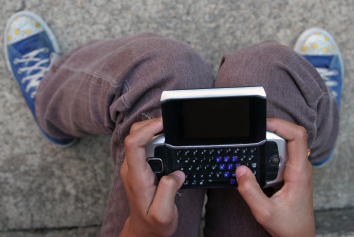A Day For Dumping on Texting: Give It Up

Sending short text messages from mobile phones have become arguably the most popular method of instant communications among teenagers and young adults.
That was established last fall, when Nielsen reported not only that the average mobile customer placed 357 text messages and only 204 phone calls in the second quarter of 2008. More trenchantly, mobile users aged 13 to 17 placed 1,742 text messages a month and those 18 to 24 790.
So now it seems time to rain on texting's parade. The touchpoint was The New York Times' report on the possible skewing of the results of the "American Idol" vote last week that crowned Arkansas' Kris Allen over the expected victor Adam Lambert.
The Times reported:
Representatives of AT&T helped fans of Mr. Allen at the two Arkansas events by providing instructions on how to send 10 or more text messages at the press of a single button, known as power texts. Power texts have an exponentially greater effect on voting than do single text messages or calls to the show’s toll-free phone lines. The efforts appear to run afoul of “American Idol” voting rules in two ways. The show broadcasts an on-screen statement at the end of each episode warning that blocks of votes cast using “technical enhancements” that unfairly influence the outcome of voting can be thrown out.
And sites around the Web picked up the report with glee or furor. Of course, it was not news until the Times said it was news. The Arkansas Democrat-Gazette reported the basics of this a week ago, as the voting was taking place.
In Conway after Tuesday's performances, fans at the Estes Stadium watch party took out wireless phones and started making calls and firing off text messages - some voting on their own devices and others on phones borrowed from AT&T, which supplied about 50 display units and representatives to teach multiple "power texting." AT&T also made about 30 phones available in a "texting zone" at a watch party at the Peabody Little Rock hotel, where Megan Lynch and friend Rainey Gibson, both 22, watched Allen perform his first song of the night, Bill Withers' "Ain't No Sunshine." "I loved it," Lynch said. "One of my favorite things about Kris is that he plays his own instruments. That just shows how talented he is." Gibson, who said she would be voting nonstop, said Allen did an excellent job.
Now, this morning, WCBS-AM, a news station in New York City, delivered an assessment from the Times' reporter, Edward Wyatt, on the magnitude of the infraction. He was quoted on air putting the potential at "hundreds of thousands" or possibly a million votes.
If so, why was this not in either his report in the Times or that of the Democrat-Gazette?
The Early Show on CBS also aired a report, at about 8:20 a.m., citing the fact that 100 million votes were cast. But made no attempt to quantify whether the amount of "power texting" had any significant impact on the result.
And, of course, the producers of "American Idol" have not stated what the margin of victory for Allen over Lambert was, making it essentially impossible to determine just how little of a tempest in a teapot this is.
LIkely, not much. The text voting is already skewing the results on a much bigger scale, since, as Wyatt noted, only AT&T mobile service subscribers can use their phones to vote by text on 'American Idol.' Verizon, T-Mobile and Sprint users? Forget it. So most people can't even vote by text, no matter how popular and easy texting is. That's real skewing.
Flip back now to the Dining section of the Times and you can read a potentially greater scourge on American society from texting: Texting while eating.
Under the table messaging, at family gatherings. Being antisocial when you're supposed to be social.
Then there are all the drives to end, well, driving while texting. And how about a law about not texting when in a restroom?
Out of all this, the only one that matters is texting while driving. We'll soon logically be at a point where there will be laws in every state where you can't hold or touch a communications device of any kind while driving. And there should be a serious look at extending that sphere of infraction to men's razors, women's eyeliner and other grooming props.
But this is about texting. Let parents teach their offspring what the rules are at the dinner table. And let the next generation figure out whether they will even gather at a dinner table, when they have their own families, or whether they'll just converse by texting at whatever tables in whatever rooms they and their successor offspring choose to be in. Let the 'American Idol' producers go about their business. They'll have to constantly tweak their technical protections against over-fervent fans. Or just take a whatever-goes stance.
Only with driving while texting is public safety at stake. If someone wants to waste message units on power texting or take a dump while texting, so be it.
Just don't dump on texting. It's here to stay. And in the main, mobile phone users are letting their fingers do their talking, now. Not their voices.
So be it. Deal with it.
IMAGE SOURCE: Examiner.com
